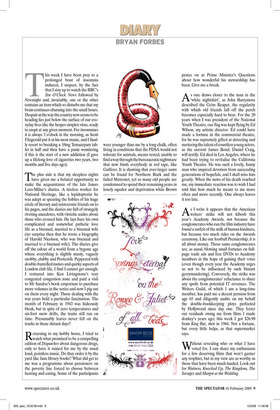T his week I have been prey to a prolonged bout
of insomnia induced, I suspect, by the fact that I stay up to watch the BBC’s Ten O’Clock News followed by Newsnight and, invariably, one or the other contains an item which so disturbs me that my brain continues churning into the small hours. Despair at the way the country now seems to be heading lies just below the surface of our everyday lives like the herpes simplex virus, ready to erupt at any given moment. For insomniacs it is always 3 o’clock in the morning, as Scott Fitzgerald put it at his most manic, and I finally resort to breaking a 10mg Temazepam tablet in half and then have a panic wondering if this is the start of a new addiction (I gave up a lifelong love of cigarettes two years, two months and five days ago).
The plus side is that my sleepless nights have given me a belated opportunity to make the acquaintance of the late James Lees-Milne’s diaries. A tireless worker for National Heritage, like a lepidopterist he was adept at spearing the foibles of his huge circle of literary and aristocratic friends on to his pages, and the diaries are full of strangely riveting anecdotes, with vitriolic asides about those who crossed him. He lays bare his own complicated and somewhat pathetic love life as a bisexual, married to a bisexual wife (no surprise then that he wrote a biography of Harold Nicolson, who was bisexual and married to a bisexual wife). The diaries give off the odour of a world from a bygone age where everything is slightly musty, vaguely snobby, clubby and Pooterish. Peppered with double-barrelled names and quirky aspects of London club life, I find I cannot get enough. I ventured into Ken Livingstone’s very congested congestion zone and paid a visit to Mr Sandoe’s book emporium to purchase more volumes in the series and now I pig out on them every night. Those dealing with the war years hold a particular fascination. The month of February in 1943 was hideously bleak, but in spite of zero temperatures and six-foot snow drifts, the trains still ran on time. Presumably leaves never fell on the tracks in those distant days?
Returning to my hobby horse, I tried to watch what promised to be a compelling edition of Dispatches about dangerous drugs, only to have it ruined for me by the usual loud, pointless music. Do they order it by the yard like faux library books? What did get to me was a programme about pensioners on the poverty line forced to choose between heating and eating. Some of the participants were younger than me by a long chalk, often living in conditions that the PDSA would not tolerate for animals, means tested, unable to find a way through the bureaucratic nightmare that now binds everybody in red tape, like Gulliver. It is shaming that ever-larger sums can be found for Northern Rock and the failed Metronet, yet so many old people are condemned to spend their remaining years in lonely squalor and deprivation while Brown prates on at Prime Minister’s Questions about how wonderful his stewardship has been. Give me a break.
As one draws closer to the man in the ‘white nightshirt’, as John Barrymore described the Grim Reaper, the regularity with which old friends fall off the perch becomes especially hard to bear. For the 20 years when I was president of the National Youth Theatre, our flag was kept flying by Ed Wilson, my artistic director. Ed could have made a fortune in the commercial theatre, for he was supremely gifted at detecting and nurturing the talent of countless young actors, as the current James Bond, Daniel Craig, will testify. Ed died in Los Angeles, where he had been trying to revitalise the California Youth Theatre. He was such a lovely, funny man who inspired devotion from succeeding generations of hopefuls, and I shall miss him greatly. When the news of his death reached me, my immediate reaction was to wish I had told him how much he meant to me more often and more recently. One always leaves it too late.
As I write it appears that the American writers’ strike will not kibosh this year’s Academy Awards, not because the conglomerates who run the film industry have found a surfeit of the milk of human kindness, but because too much rides on the Awards ceremony. Like our football Premiership, it is all about money. Those same conglomerates are, as usual, blowing small fortunes on fullpage trade ads and free DVDs to Academy members in the hope of gaining their votes (even though every year the Academy urges us not to be influenced by such blatant gerrymandering). Conversely, the strike was about the conglomerates’ reluctance to share any spoils from potential IT revenues. The Writers Guild, of which I am a long-time member, has paid me a decent pension from age 65 and diligently audits on my behalf the double-bookkeeping ploys perfected by Hollywood since day one. They ferret out residuals owing me from films I made donkey’s years ago; this week I got $26.90 from King Rat, shot in 1964. Not a fortune, but every little helps, as that supermarket says.
Without revealing who or what I have voted for, I can share my enthusiasm for a few deserving films that won’t garner any trophies, but in my view are as worthy as those that have been much lauded. Look out for Waitress, Knocked Up, The Kingdom, The Savages and Margot at the Wedding.


















































































 Previous page
Previous page